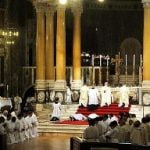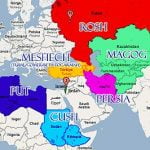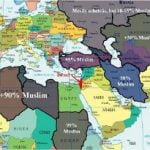Watching a very graphic documentary on world hunger. Similar to watching the camps of Dachau and Belsen being liberated. Except these are not camps, they are feeding stations where the black skeletons crawl to. There they wait under the sun and wind, and they wait, for the aid that may not arrive.
Makes one truly hate obesity, being overfed, overpaid and unconcerned, our priorities, all we do and all we stand for.
Jesus identified Himself as being Bread and Water. God himself promised His followers only Bread and Water, not luxuries. Our prayers are to be for only daily bread and water. Those were Gods priorities and His bottom line…to all of us…to all who call on Him. Give us this day our daily bread, no more, no less!
The trials at Nuremberg will again convene and we collectively are the accused…… and then we can all say we did NOT know!!!
Given we like to process their grain into our ethanol at a loss which we tax payers subsidize – so we push the food price beyond their means. Then we can pour it into a gas tank, while the oil we have lies under the soil, so not to disturb the polar bears…?
The extremists are right. We are the great satan! The world is their recruiting station and our policies and values, are their clarion call.
- Every year 15 million children die of hunger
- Throughout the 1990’s more than 100 million children did die from illness and starvation. Those 100 million deaths could have been been prevented for the price of only ten (10) US Stealth bombers, or what the world spends on its military in two days!
- The World Health Organization estimates that one-third of the world is well-fed, one-third is under-fed one-third is starving. Since you’ve entered this site at least 200 people have died of starvation. Over 4 million will die this year.
- Nearly one in four people, 1.3 billion – a majority of humanity – live on less than $1 per day. UNICEF
- 3 billion people in the world today struggle to survive on US$2/day.
- Half of all children under five years of age in South Asia and one third of those in sub-Saharan Africa are malnourished.
- Malnutrition is implicated in more than half of all child deaths worldwide – a proportion unmatched by any infectious disease since the Black Death
- To satisfy the world’s sanitation and food requirements would cost only US$13 billion– what the people of the United States and the European Union spend on perfume each year
- Every 3.6 seconds someone dies of hunger
- It is estimated that some 800 million people in the world suffer from hunger and malnutrition, about 100 times as many as those who actually die from it each year.
Nuremberg. MR. JUSTICE JACKSON: May it please Your Honors: The privilege of opening the first trial in history for crimes against the peace of the world imposes a grave responsibility.
The wrongs which we seek to condemn and punish have been so calculated, so malignant, and so devastating, that civilization cannot tolerate their being ignored, because it cannot survive their being repeated.









